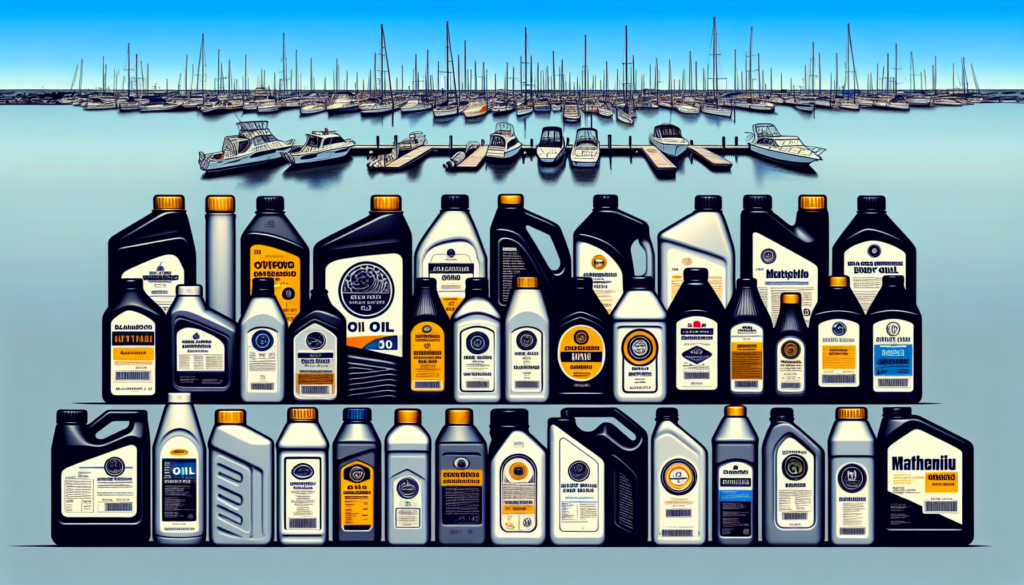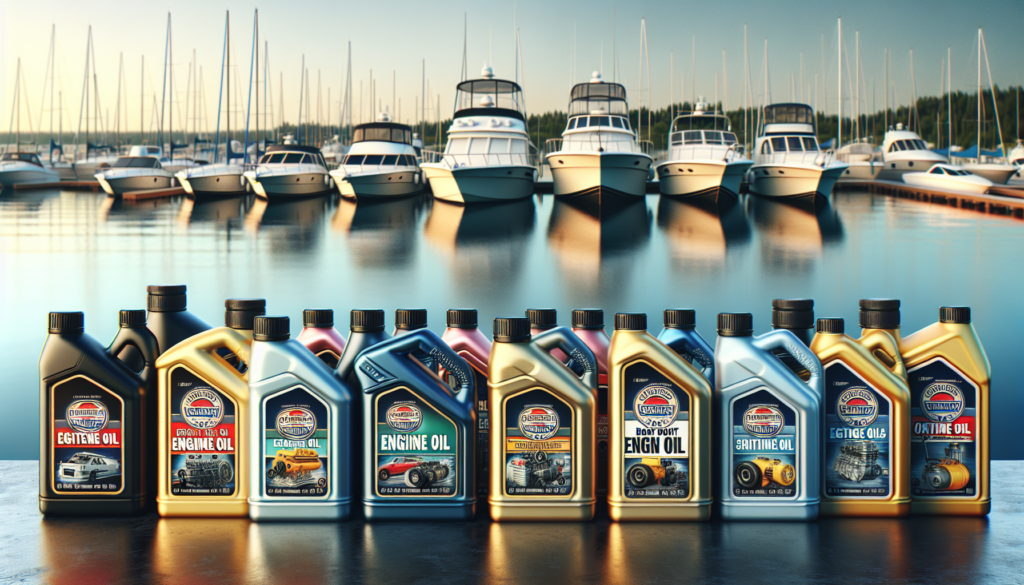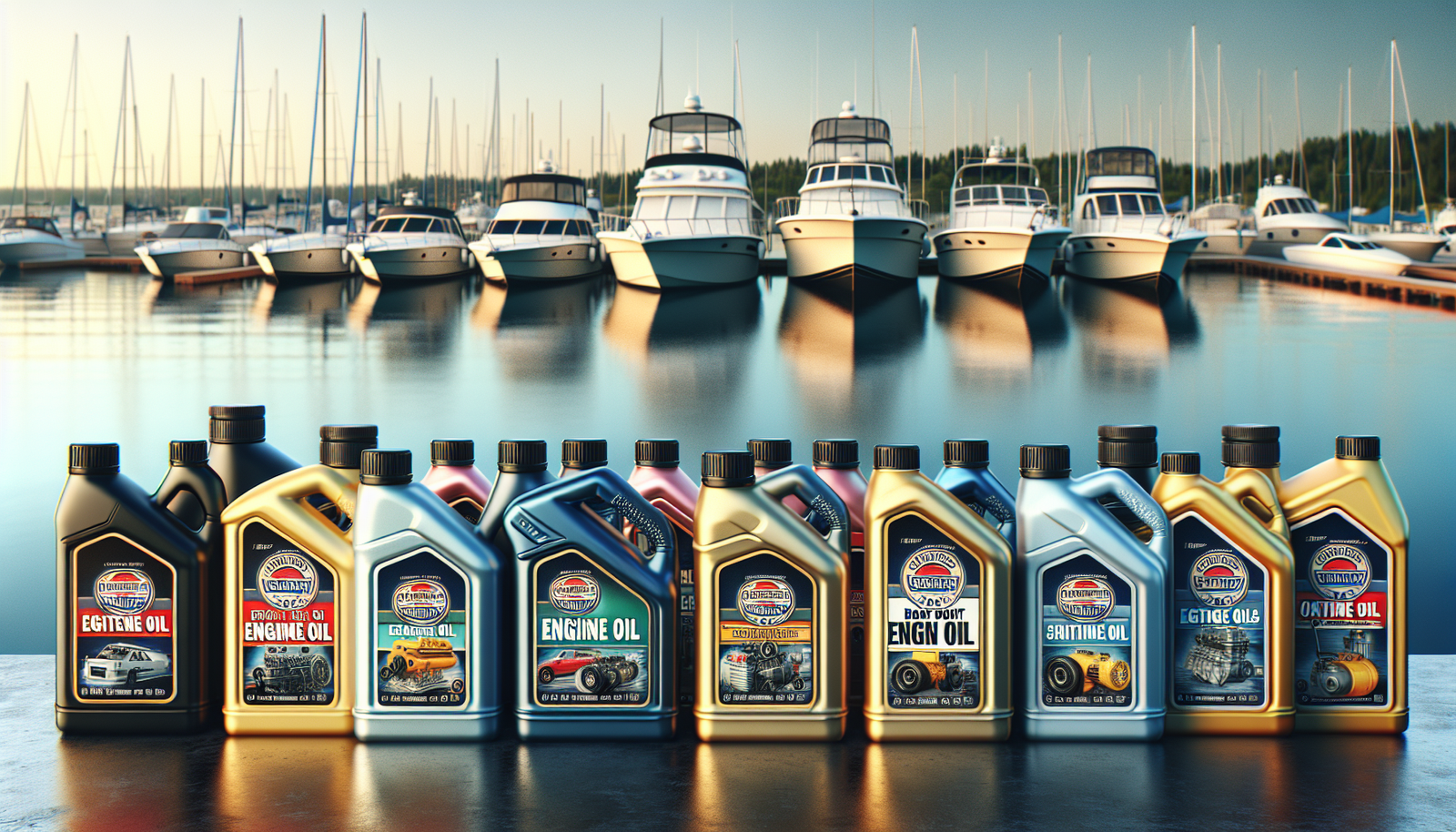Unleashing the full potential of your boat’s engine hinges on your ability to select the best engine oil. It might seem like a minor decision, but let’s tell you, picking the proper oil could directly affect the lifespan, fuel efficiency, and performance of your vessel. So to put you in the driving seat, this article seeks to simplify the often-complex world of boat engine oil. Wrapped in straightforward segments, it will walk you through vital factors such as oil grade, viscosity, additives, and type- casting light on the path to making the perfect choice and fostering a smooth sail. Enjoy the ride!
Understanding the Importance of Engine Oil
Let’s get real – engine oil is essential for your boat’s engine. It plays a critical role in ensuring the smooth operation and longevity of your engine. Understanding its importance is the first step towards maintaining your boat optimally.
Role of engine oil in marine engines
Engine oil is like the lifeblood of your boat’s engine. It lubricates the engine, reduces friction between moving parts, and absorbs excess heat, thereby preventing overheating. Besides, it also plays a crucial role in cleaning the engine from sludge and preventing rust and corrosion. Without the right kind of oil, your boat’s engine would be prone to serious damage and a short lifespan.
Effects of wrong engine oil on performance
Using the incorrect type of engine oil can have a detrimental impact on your boat’s performance. Low-quality oil or an unsuitable type can result in decreased efficiency, increased fuel consumption, and possibly even engine failure. From knocking to overheating, engine problems stemming from poor oil quality can lead to costly repairs.
Benefits of choosing the right engine oil
The benefits of selecting the right engine oil are immense. It ensures a smoother ride by reducing engine noise and vibration, enhances fuel efficiency, and prolongs the engine’s lifespan by reducing wear and tear. Moreover, it saves you from frequent and hefty engine repair bills.
Identifying your Boat’s Engine Type
Before you can pick the right oil, you need to understand your boat’s engine type. Different engines have different needs, and understanding these specifics is vital in choosing the correct engine oil.
Different types of boat engines
Boat engines are classified mainly as inboard engines, outboard engines, and stern-drive engines. Inboard engines are located inside the boat’s hull, while outboard engines hang off the back of the boat. The stern-drive engine, on the other hand, is a hybrid, combining features of both.
How to identify your engine type
Identifying your boat’s engine type is straightforward. You can determine it based on its location and design or refer to your boat’s manual which should carry specific details about your engine type.
Role of engine type in oil selection
The engine type plays a vital role in oil selection as different engines have different lubrication needs. For instance, inboard and stern-drive engines usually require heavier oils, while outboard motors typically prefer lighter oils.

Oil Types and Their Characteristics
There are mainly three types of engine oils – mineral oil, synthetic oil, and semi-synthetic oil. Each has its unique characteristics and benefits, making it suitable for specific engine requirements.
Mineral oil
Mineral oils are the traditional form of engine oils. They are inexpensive and ideal for older engines that do not have high-performance demands.
Synthetic oil
Synthetic oils are man-made and designed for ultimate engine protection and performance. These oils provide superior lubrication, last longer, and handle extreme temperatures better than mineral oils. However, they are more expensive.
Semi-synthetic oil
As the name suggests, semi-synthetic oils are a blend of mineral oils and synthetic oils. They offer better performance than mineral oils at a lesser price than pure synthetic oils. These oils are a popular choice for most boaters due to their balanced features and cost.
Viscosity of oils and their importance
Viscosity refers to the oil’s resistance to flow. High viscosity oils are thick and flow slowly, offering better lubrication and coverage. However, they may not perform as well in cold temperatures. Low viscosity oils flow easily, offering swift lubrication and better performance in cold weather. Thus, selecting the right oil viscosity is vital for optimal engine performance.
How Weather Affects Your Oil Choice
Weather conditions can greatly impact the performance of your engine oil. Understanding how to adjust your oil choice based on weather is key to efficient boat maintenance.
Impact of cold weather on engine oil
Cold weather can affect the flow of engine oil. High-viscosity oil, which is ideally thicker, may become too thick in cold temperatures and won’t circulate properly, leading to insufficient lubrication.
Challenges of warm weather for engine oil
Warm weather presents its challenges too. Under high temperatures, low-viscosity oil may become too thin to provide adequate lubrication.
How to choose engine oil based on weather conditions
The best practice is to use low-viscosity oil in cold weather for quick starting and high-viscosity oil in warm weather for better coverage and protection. And if you live in an area with extreme seasonal changes, consider using multi-grade oil that adjusts to different conditions.

The Role of Brand in Oil Selection
Sure, the brand of your engine oil matters! High-quality brands invest in research and development to offer superior products that protect your engine better.
Why brand matters
A recognized brand typically means quality and reliability. Such companies have the resources and expertise to develop high-quality oils that provide maximum protection and performance.
Trusted brands in the marine oil industry
There are several trusted brands in the marine oil industry. Brands like Quicksilver, Yamalube, and Mercury Marine are favorites among boaters due to their proven record of quality and reliability.
Dealing with non-branded or lesser-known brands
While choosing a lesser-known brand might save you a few dollars initially, it might not provide the same level of protection, potentially leading to costly repairs down the line. If you must go for a non-branded or lesser-known brand, ensure to do thorough research and understand its performance chart.
Determining the Right Viscosity for Your Boat
Choosing the right viscosity for your boat engine oil is essential for ensuring optimal performance.
What is oil viscosity
Oil viscosity refers to the oil’s resistance to flow. It is a key factor in determining how well an oil will perform in different temperatures and under varying conditions.
Importance of oil viscosity in marine engines
The correct oil viscosity ensures that the oil properly circulates, lubricates, and cools the engine components. Too thick, and the oil won’t circulate properly. Too thin, and it won’t provide sufficient protection.
How to choose the proper viscosity based on your boat’s specifications
The best way to determine the appropriate viscosity for your boat is to refer to your boat engine’s manual. It will have detailed specifications about the right viscosity level.

Considering the Age of the Boat
Believe it or not, the age of your boat can affect your choice of engine oil.
Impact of boat engine age on oil selection
As boat engines age, they tend to require more care. Older engines may benefit from higher viscosity oil, which can provide extra protection to worn engine components.
Oil selection tips for older boat engines
For older boats, consider using high-viscosity oil or oil formulated specifically for high-mileage engines. These types of oils contain additives that can help protect and prolong the life of your aging engine.
Oil choices for newer boat engines
For newer engines, a lower-viscosity oil might be a good choice. It can easily circulate and lubricate internal engine parts, which can maximize performance and fuel efficiency.
Frequency and Duration of Boat Use
How often and for how long you use your boat can influence your choice of engine oil.
Managing oil changes for frequent boat use
If you use your boat quite often, you’re likely to need oil changes more frequently. Regular use means more wear and tear, which can degrade the oil’s effectiveness over time.
Understanding oil longevity and performance for occasional boating
On the other hand, for occasional boaters, the main concern might be oil ageing rather than oil degradation from use. Even if you don’t use your boat much, it’s still important to change the oil at least annually to ensure optimal performance.
Determining the best oil based on usage habits
For frequent use, consider synthetic oils or blends as they tend to last longer. For less frequent use, a high-quality mineral oil may be an economical choice but remember to replace it at least annually.

Factors Related to Specific Boating Activities
The activities you predominantly use your boat for can also play a part in the type of oil you need.
How fishing impacts engine oil choice
If you use your boat for fishing activities, you would likely run the engine at lower speeds for prolonged periods. This might call for a higher viscosity oil that can maintain a steady film of lubrication over time.
Adapting engine oil to high-speed boating
For high-speed boating or racing activities, the engine operates under higher temperatures. Synthetic oils that stand up to such high operational temperatures would be advised.
Choosing oil for leisure or cruising activities
For leisure activities or cruising where the motor usually operates at a moderate speed, semi-synthetic oil would strike an optimal balance between performance and cost.
Cost Considerations and Budgeting for Boat Oil
Finally, the cost is inevitably an important factor when choosing engine oils.
Understanding pricing of engine oils
Engine oil prices can vary, with synthetic oils being typically more expensive than mineral oils, and brand-name oils costing more than the lesser-known brands.
Balancing quality and cost in choosing boat oil
While cost-saving is important, compromising on oil quality can lead to costly engine repairs down the line. It’s critical to balance the cost and quality to ensure the longer life of your boat’s engine.
Planning and budgeting for regular oil servicing and changes
Considering your boat’s condition and usage habits, plan for regular oil servicing. This includes oil changes, filter replacements, and oil system cleanings. Budgeting for these services will help ensure your boat runs smoothly for years to come.
In conclusion, a lot goes into selecting the right engine oil for your boat. Understanding your boat, its engine, and your boating habits can take you a long way in making an informed decision. And remember, the right oil not only guarantees optimal performance but also preserves your engine, saving you from hefty repair bills in the long run.



[…] basic elements of boat engine maintenance include regular oil changes, fuel system care, cooling system upkeep, belt, cables, and hoses checks, as well as regular engine […]
[…] It’s essential to understand the metrics of power and performance when choosing your engine. […]